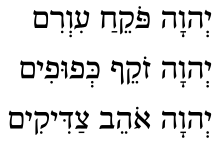Psalm 146
Psalm 146 is the 146th psalm of the biblical Book of Psalms. In the Greek Septuagint version of the bible, and in its Latin translation in the Vulgate, this psalm is Psalm 145 in a slightly different numbering system.
| Psalm 146 | |
|---|---|
Scroll of the Psalms | |
| Book | Book of Psalms |
| Hebrew Bible part | Ketuvim |
| Order in the Hebrew part | 1 |
| Category | Sifrei Emet |
| Christian Bible part | Old Testament |
| Order in the Christian part | 19 |
Psalm 146 is the first of 5 final concluding praise Psalms in the Psalter. Many of the themes in this Psalm also are found in Isaiah 61, and Leviticus 25 (the year of Jubilee) regarding setting captives free. This is also a vocational description claimed by Jesus for himself in Luke 4 quoting Isaiah 61.
Uses

Ps 146.
Judaism
- The psalm in its entirety is recited during Pesukei Dezimra, the initial section of the daily morning prayer service.[1]
- The blessings Pokeiakh Ivrim ("gives sight to the blind"), Matir asurim ("releases the bound"), Zokef kefufim ("straightens the bent"), from the Birkat HaShachar are derived from Psalm 146:7-8.[2]
- Verse 10 is part of Kedusha,[3] and is a part of the third blessing of the High Holidays Amidah.[4]
Christianity
- Verse 6 is quoted in the New Testament in Acts 4:24; Acts 14:15[5]
- Since the Middle Ages, this psalm was recited or sung during the vespers office on Thursday, according to the Rule of St. Benedict, established in 530 AD.[6][7] In the modern Roman Catholic Liturgy of the Hours, Psalm 139 is recited at Vespers, and also Wednesday's fourth week.[8] In the liturgy of the Mass, it is played or sung for the feast of St. John the Baptist.
Set to music
- The cantata am achten Sonntage nach Trinitatis, Johann Sebastian Bach, who gets verse 23,
- Psalm 139, Paul Blumenthal, with verses 23 and 24,
- Psalm 139, of Johann Nepomuk David for mixed choir,
- The 139th Psalm, Ernst Pepping, for mixed choir for four voices and orchestra,
- 139th Psalm, Franz Koglmann for mezzo-soprano, trumpet, trombone and tuba,
- The Wings of the Morning, David Evan Thomas, for medium voice and piano,
- Psalm 139, Rudi Spring, for viola, mixed choir and organ,
- Psalm 139, Joseph Scrivener, for medium voice and piano.
References
- The Complete Artscroll Siddur page 70
- The Complete Artscroll Siddur page 18
- The Complete Artscroll Siddur page 100
- The Complete Artscroll Machzor for Rosh Hashanah page 67
- Kirkpatrick, A. F. (1901). The Book of Psalms: with Introduction and Notes. The Cambridge Bible for Schools and Colleges. Book IV and V: Psalms XC-CL. Cambridge: At the University Press. p. 840. Retrieved February 28, 2019.
- Prosper Guéranger, Règle de saint Benoît, (traduction de Prosper Guéranger, réimpressin 2007)
- Psautier latin-français du bréviaire monastique, 1938/2003 p 519.
- The main cycle of liturgical prayers takes place over four weeks.
External links
| Wikimedia Commons has media related to Psalm 146. |
This article is issued from Wikipedia. The text is licensed under Creative Commons - Attribution - Sharealike. Additional terms may apply for the media files.